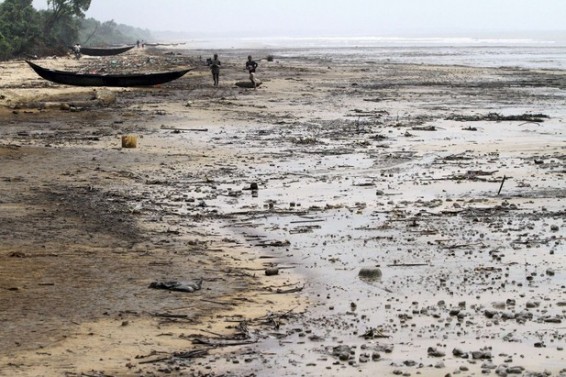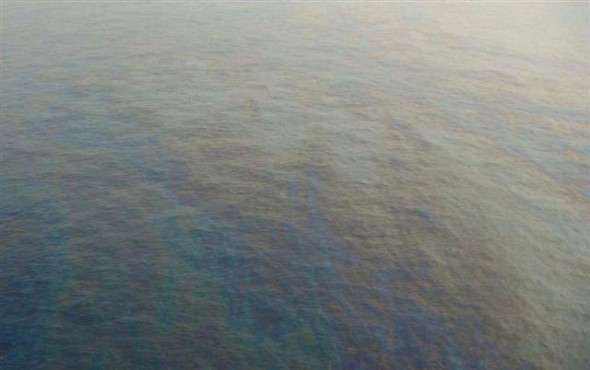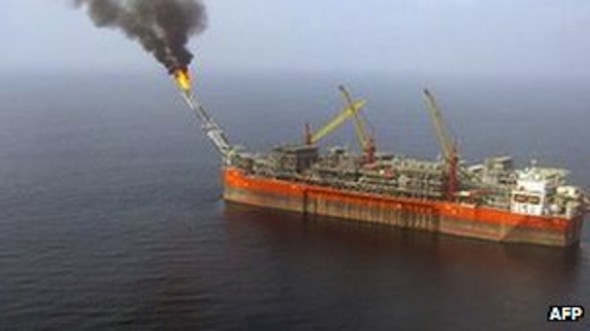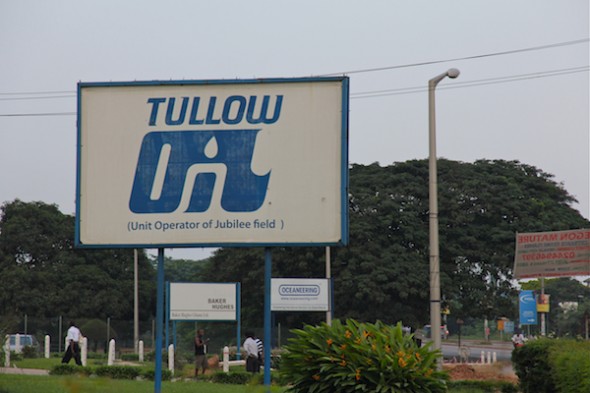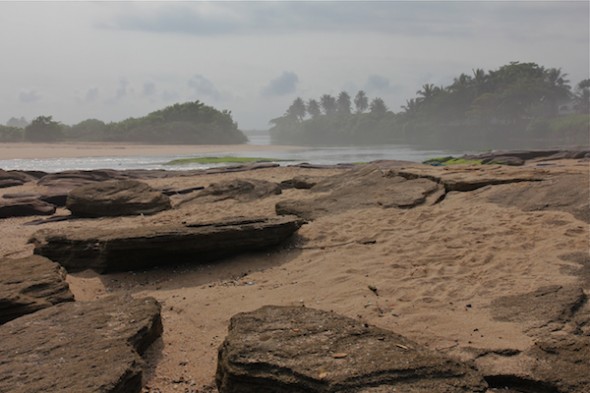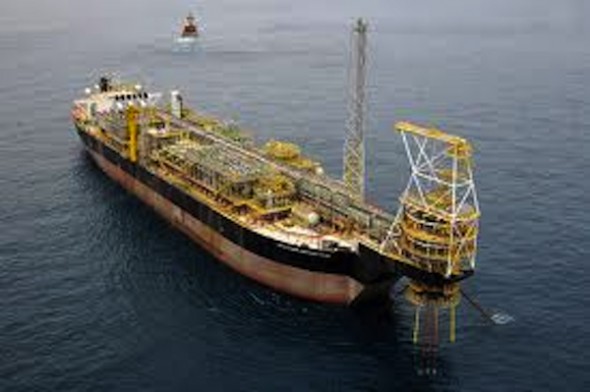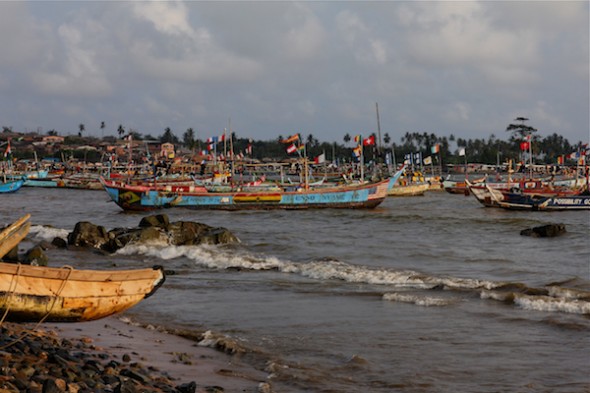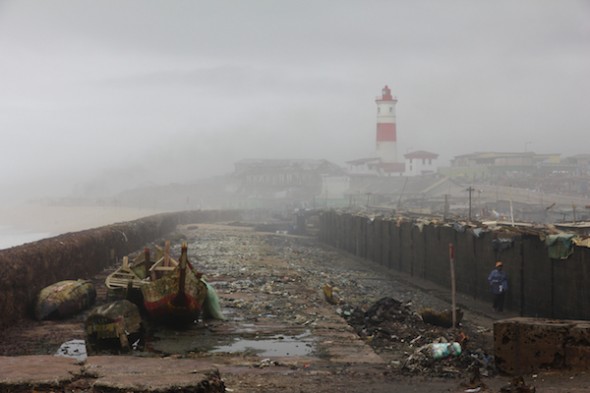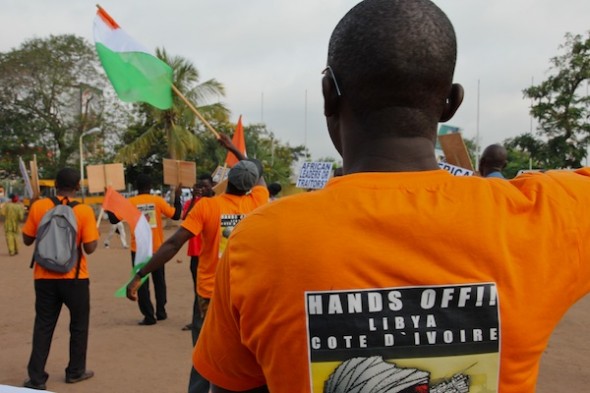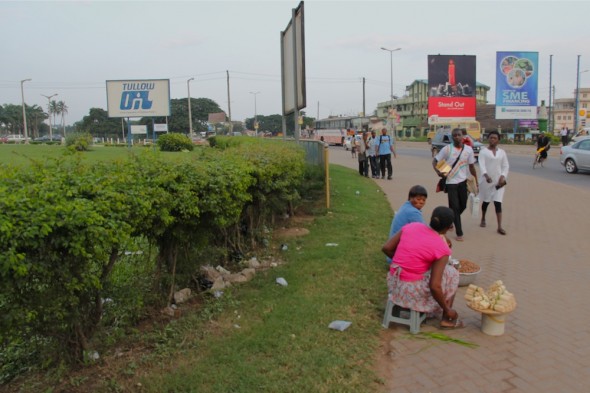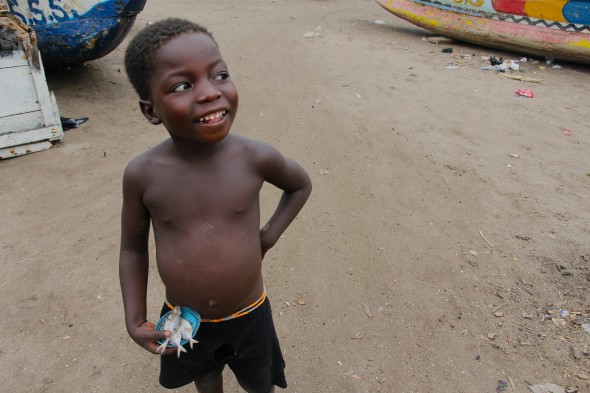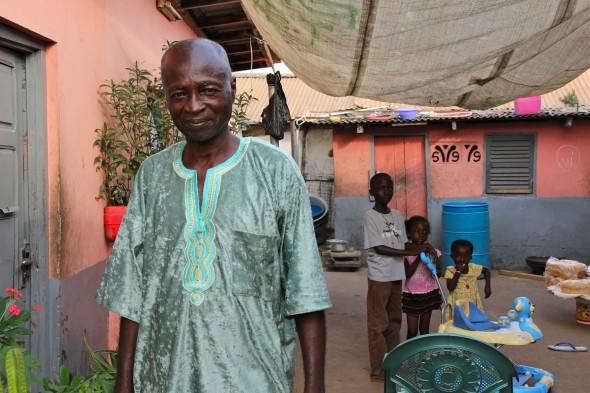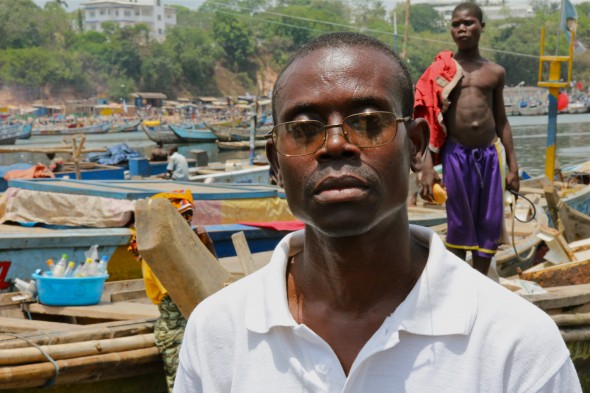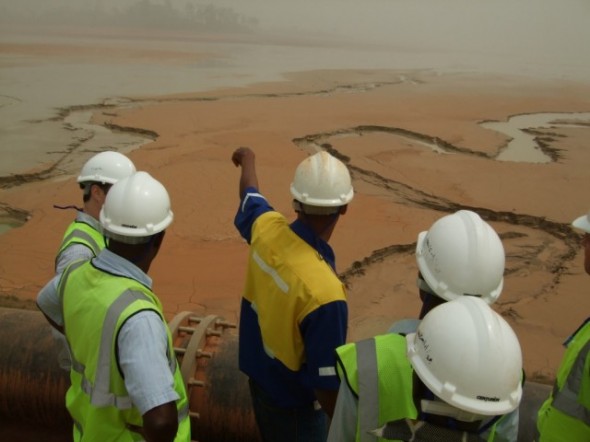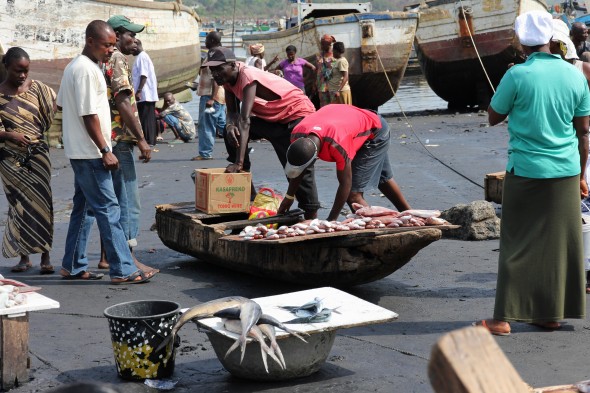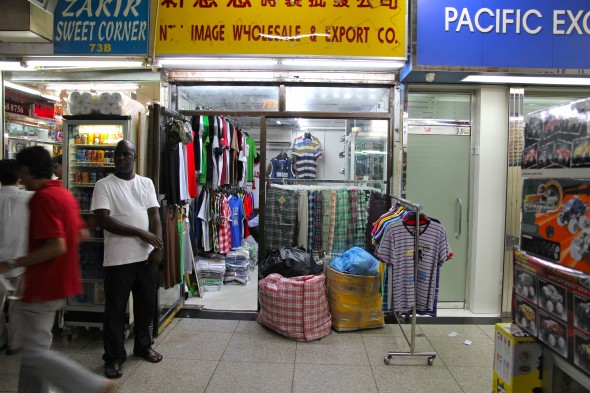Is Ghana really ready for oil?
Is Ghana ready for an oil disaster? It’s difficult to find officials who want to talk about the subject. Most prefer saying things like, “We learned many lessons from the Deepwater Horizon spill,” and, “It can’t happen here.” Truth is (and everyone knows this), a disaster can strike anywhere.
Ghana has been producing oil from its offshore Jubilee field since December 2010, yet still lacks monitoring vessels, equipment and personnel. The country has an “oil spill response plan” — on paper — but could Ghana actually respond to and deal with a significant oil spill?
This video and a new article published today on iwatch news explore the state of Ghana’s environmental regulation and emergency preparedness.
Bonga field: Back to business as usual
LAGOS, Nigeria — Royal Dutch Shell PLC’s Nigerian subsidiary says it has resumed production at a 200,000 barrel-per-day oil field after containing the worst Nigeria offshore spill in more than a decade.
Spokesman Tony Okonedo said in a statement Thursday that steps had first been taken to ensure it was safe to restart production at the Bonga deep-water oil field.
That’s the word from the Associated Press. Reuters adds a bit more information:
Nigerian villagers say oil from the spill at Bonga, 120 km offshore, had washed up on the coast, blackening stretches of it and killing fish, but Shell has denied that the oil could be from the Bonga facility.
2012 off to a rocky start in the Gulf of Guinea
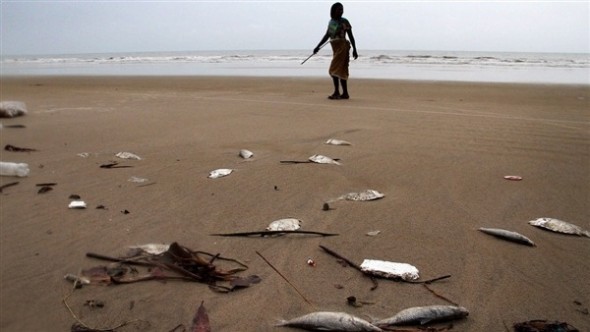
A woman walks past some of the hundreds of dead fish believed to have been killed as a result of the recent oil spill off the coast of Nigeria. Photo: George Esiri/EPA
The 40,000 barrel (1.68 million gallon) oil spill that occured sometime around December 20th at Shell’s Bonga facility 120 km off the coast of Nigeria has not been good for the new year.
Well, I should qualify: it hasn’t been good for Nigerians. Nigeria’s largest offshore spill (as opposed to onshore, where larger spills have certainly occurred) in more than a decade hasn’t made a dent in Shell’s stock price and is only getting minimal media coverage outside the country.
As I wrote a few days ago, Shell announced that clean up crews had “contained” the spill before it hit land. According to the company, clean-up crews, dispersants and nature worked together to prevent the spill from arriving onshore. At the same time Shell reported that clean-up crews had discovered a second spill — one that reached land — having nothing to do with the Bonga oil leak.
Shell continues to deny that the onshore mess has anything to do with the Bonga field spill, but many are doubting those claims. The amount of oil that has washed ashore looks substantial (Euronews has produced a short video report that includes villagers showing barrels of oil they’ve shoveled up: Coastal pollution fears after Nigeria oil spill). Could this really be the result of a passing tanker spill/dump? Shell said the company would analyze the oil on the beach to prove it has nothing to do with the Bonga facility.
More Nigeria news from SkyTruth
Why do we hear so little about spills in the Gulf of Guinea region? Well, there are the officials and companies who don’t (seem to) give a damn. There are the restrictions on the press in a number of countries and the lack of resources for journalists across the region that hamper in-depth reporting. But there’s also the fundamental lack of oversight: we don’t hear much because the governments themselves don’t know much. They don’t have monitoring systems and are — far too often — at the mercy of the oil companies when it comes to getting information about spills and clean-up.
SkyTruth, an organization that seeks to create environmental awareness through the use of satellite imagery (“If you can see it, you can change it”), has been posting regular updates on the recent Bonga spill.
I’m reposting links to the last two pieces from SkyTruth, which get at several crucial points regarding the Gulf of Guinea: No one knows what’s going on because of the lack of monitoring and oil is being spilled or dumped all the time in the region. Remember the spill off the coast of Ghana in November? Was it from the Jubilee operations or a passing tanker? Who knows?
Continue reading . . .
Did someone say oil spill?
As the spill offshore Nigeria works its way to shore, the lack of information about what is actually happening is depressingly familiar.
Shell reports that less than 40,000 barrels were spilled (at 42 gallons per barrel, that’s something like 1.6 million gallons), but there’s no way to verify that information. Shell posted a photo of the source of the spill, a rupture in the line that carries oil from the offshore storage facility (the FPSO) to oil tankers.
One year already…
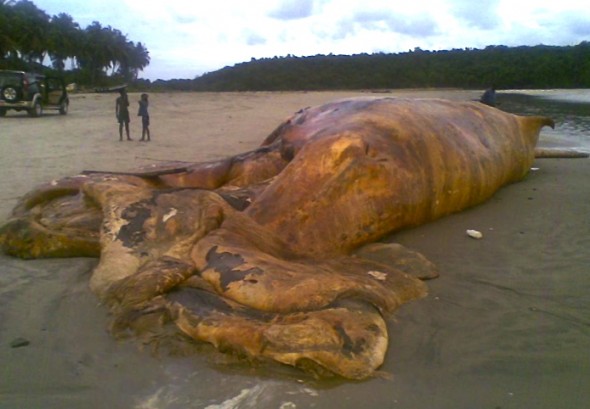
The eighth dead whale to wash ashore in the Western Region since late 2009. The Ghana EPA says there's no connection to oil drilling, but doesn't offer any details to back up the assertion. Photo courtesy of Friends of the Nation.
Yes, Ghana has been an oil producing nation for one year now.
One year on and where do things stand? In terms of environmental oversight, not much has changed and there remains much progress to make.
What’s killing the dolphins?
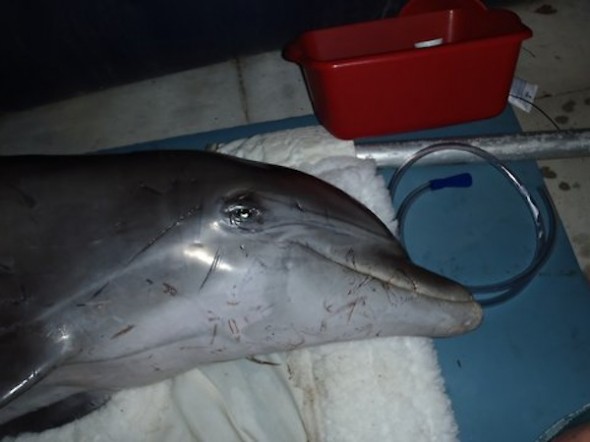
An injured dolphin as it appeared when rescued in Alabama last week. Photo: Institute for Marine Mammal Studies
I read an interesting post in the New York Times Green blog about the dolphin die-off in the Gulf of Mexico. Since early 2010 dead dolphins have been washing ashore at an alarming rate and among the many possible explanations for the 600 dead dolphins is — of course — the BP oil spill. According to the article, which I’m pasting below, scientists are not yet able to determine the cause of the die-off.
This made me think of the recent rash of beached dead whales in Ghana, which, according to the Ghana EPA, is unrelated to the country’s oil activities. I wonder how the Ghana EPA was able to make such a determination so quickly. The New York Times piece gives the impression that determining the exact cause of death of these beached mammals is quite complicated.
Off the radar…
I’m working on a story about the regulation and oversight of the offshore industry across the Gulf of Guinea and should be wrapping it up in a few weeks. That’s been keeping me from posting much lately.
Three weeks have now passed since the spill in the Ahanta West District. I am still unable to communicate any official, on-the-record information about what happened. A few days ago, the Ghana EPA said that the whale deaths in the Western Region could not be “attributed” to oil exploration, stating that there is no scientific proof for that claim. But the main thing to glean from the EPA statement is that no one knows what has caused the recent deaths. We can’t say they were provoked by the oil operations, but we can’t say they were the result of anything else, either.
There’s more news coming out about Jubilee’s production problems. When Ghana’s oil production began in December, the Jubilee partners estimated that production levels would rise to 120,000 b.p.d. within six months. But the “ramp up” has been delayed repeatedly and last month Anadarko, responding to stockholder concerns, went as far as saying that some well redesign was necessary. What had been a delay began to look like a real problem.
From Ahanta West to Accra
Nearly two weeks have passed since fishermen first spotted an oil slick offshore in the Jubilee field area. As they predicted when reporting what they had seen, the oil drifted to shore where it remained until local community members cleaned up the mess.
I’ve been trying to get more information on this spill, which according to someone at EPA, came from a tanker. There’s no way to know with any certainty that this is the case. All the information I have been able to get so far is unofficial. To date there has not been any official statement on the spill — either its source or the amount of oil spilled.
Meanwhile over in Accra, concerns are growing about the financial side of the oil business. I’m pasting an article from VOA below. The reporter writes that,”There remain serious risks the current boom will not be beneficial to most Ghanaians,” and continues with a description of ongoing problems.
Oil Spill in Ahanta West District
An oil slick, first spotted by fishermen November 3rd, has washed ashore in the Ahanta West District. At this point there is little information available. The government is suggesting the oil leaked from or was dumped by a tanker, but is providing no proof or details. Fishermen report first seeing the slick near the Jubilee field and some suspect that the spill is related to the oil activities. Neither Tullow Oil nor any of the other partners has made any statements, so at this point, it is difficult to know what happened.
Jubilee partners in the news
Tullow Oil and Anadarko have been in the news, both inside and outside Ghana. In Ghana, things are going well for the two companies. Tullow, most notably, appears to be moving towards development of its recent Tweneboa and Enyera discoveries (translation: more commercial oil production on the way).
Outside of Ghana it’s a different story. In Uganda, Tullow is caught up in a political scandal involving corruption allegations. The Ugandan government has blocked Tullow’s sale of some of its Ugandan holdings to Total and CNOOC, pending an investigation. Tullow categorically denies the allegations, but there’s no denying that Uganda’s oil adventure does not look to be off to a good start.
Gas flaring and Axim: an update…sort of
Last month I wrote about strange eye infections in Axim that some locals blamed on gas flaring. Axim, or Tired of Talk, I titled the post because local citizens were frustrated with talk that rarely seemed to get followed by action. When I visited Axim in August residents had been waiting several months for oil company officials to carry through on promises to send out a medical team for screenings.
An early morning in James Town
It’s a gray and damp early morning in James Town. The lighthouse in the mist makes me think of northern California.
Waiting for Kosmos…
Waiting for Kosmos. I wait endlessly and (so far) in vain for a meeting with someone I do not know. Does this sound familiar? If and when we meet, I will likely learn nothing. But then I would be able to say that Mr. X of Kosmos Energy assures me that all matters have been amicably resolved, which would make my reporting appear somehow more objective. A meaningless statement is better than no statement, or so goes the logic.
Libya, Gaddafi, oil: another view
On the African continent, a more nuanced appreciation of Gaddafi and the Libyan rebels.
While fighting continues across Libya, grisly details of the NATO-backed assault on Tripoli are beginning to emerge. At the same time the rush for Libya’s oil is on and it appears that the countries who provided early support for the rebels will have a competitive edge for new oil contracts (read The rush to grab the trophy is on! in Arab News for more details on likely winners and losers in the post-Gaddafi era).
Can Europeans pressure their oil companies to do better in Africa?
Chatham House has released a new study on the impact of oil companies on health and the environment in Africa. The study, prepared for the European Parliament, covers the problems associated with oil production in Africa and suggests what European citizens can do to affect change. There are a number of ways that Europeans (and Americans) can engage with their oil companies and governments to push for more effective regulation and better business practices. The article I’ve posted below, from IDN, reminds European readers that they need to take an active role in working for a better (cleaner, safer, more transparent) oil industry in Africa.
Small catch for small fry
Wandering around the old harbor at James Town on a gray and hazy day, I met this little fishmonger with a perfectly sized catch.
Axim, or Tired of Talk
I took a trip to Axim today. Axim is a town about an hour’s drive west of Takoradi. It’s a major fishing port, one of the largest in Ghana. There are 800 fishing canoes operating out of Axim and some of the big canoes have 20 person crews. So from Brewire to Apewosike, there are literally thousands of people fishing in the Axim area.
I met with Nana Kojo Eshun, the chief fisherman of Lower Axim. I wanted to talk to him because I’ve heard some stories from fishermen recently about health problems in Axim that some here blame on gas flaring in the Jubilee field.
Edlove Quarshie, R.I.P.
Ghana’s fishing community has lost a passionate defender.
Edlove Quarshie, fisherman, activist and officer in Ghana’s Line Hook Canoe Fishermen’s Association has passed away. I heard the terrible news today in Takoradi. I wanted to talk to Edlove about the new drilling operations and learned that he died in Accra a few days ago. There have been seven new oil discoveries in the Western Region in the past months; drilling is now moving full speed ahead at three wells. For the fishermen, this means more no-fishing zones and, possibly, more conflict.
Trouble in Ghana’s gold fields
Last week there were news reports of a standoff between the Yayaso community and personnel of the Ghana Police Service. The incident was triggered by the refusal of the community to move out of their ancestral homes to make way for Newmont Gold Ghana Limited to begin their Akyem Project. Under the watchful eyes of the Chief of Adausena, Nana Boni Abankro, Newmont Gold Ghana Limited was in the process of relocating the cemetery at Yayaso to a resettlement camp at Adausena when the people objected to the relocation. The said cemetery includes the Royal Mausoleum where past chiefs of the community have been laid to rest.
Ghana’s gold mining history is not a pretty one: exploitation, pillage and pollution are the trademarks of an industry that has brought great wealth to a few while wreaking havoc on local communities and ecosystems.
Welcome news for Ghana’s fisheries
The World Bank has announced a significant funding package (US$ 53.3. million) intended to support Ghana’s fisheries. Among other things, the funding will support efforts to reduce illegal fishing off the coast of Ghana and to improve sustainable management of the country’s fisheries. This is important news for Ghana’s fishing communities.
Oil and Beyond: Ghana looks to retool its economy
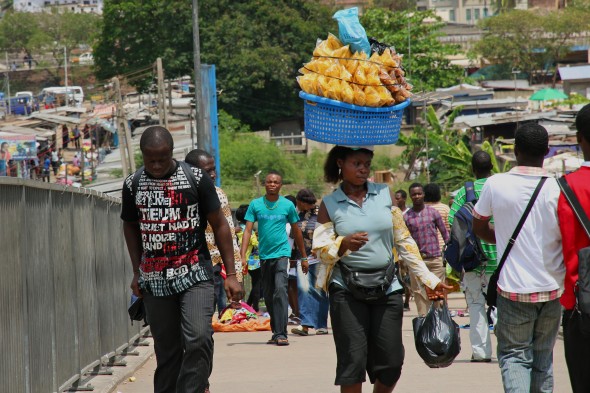
Accra. Will Ghana's oil wealth translate into improved lives for Ghanaians? Photo by Christiane Badgley
Now that Ghana has become a middle-income country, the West African nation is taking stock of the many challenges it faces, including uneven development. Authorities are consulting with experts at home and abroad on how to ensure that oil revenues benefit all Ghanaians in a sustainable manner.
Takoradi will always be home
Siddiq Fuseini grew up in Takoradi, went to school in Accra and for the past six years has been living in Hong Kong. “Takoradi will always be home,” he said, “and I’ll return. But not now.”
Oil is not enough: Africa needs industrial development
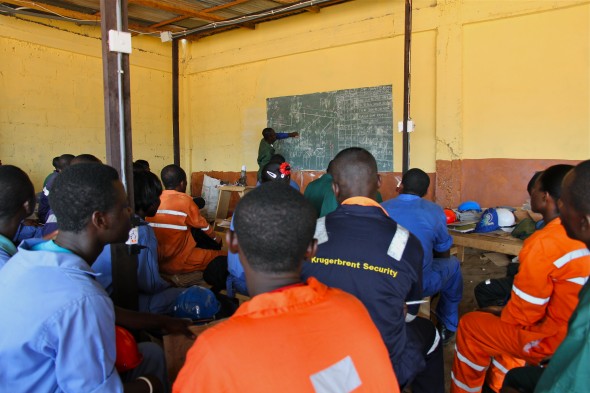
When industrial development arrives in Sekondi-Takoradi, there will be a trained workforce ready for employment. Photo by Christiane Badgley
This morning I came across an article in the Guardian, Africa must build industrial sector urgently, warns UN agency, and the timing could not be better. I’m in Guangzhou, China, marketplace for the world, and if you ever needed a reminder that manufacturing is what creates jobs and wealth and leads to real economic development, come here and look around.

